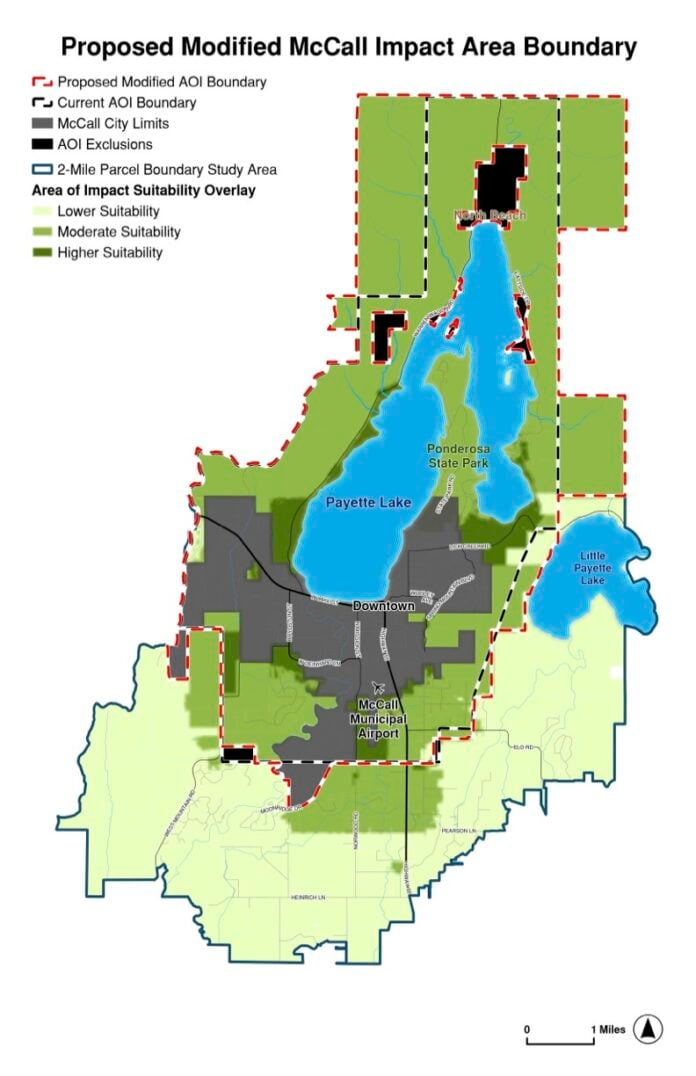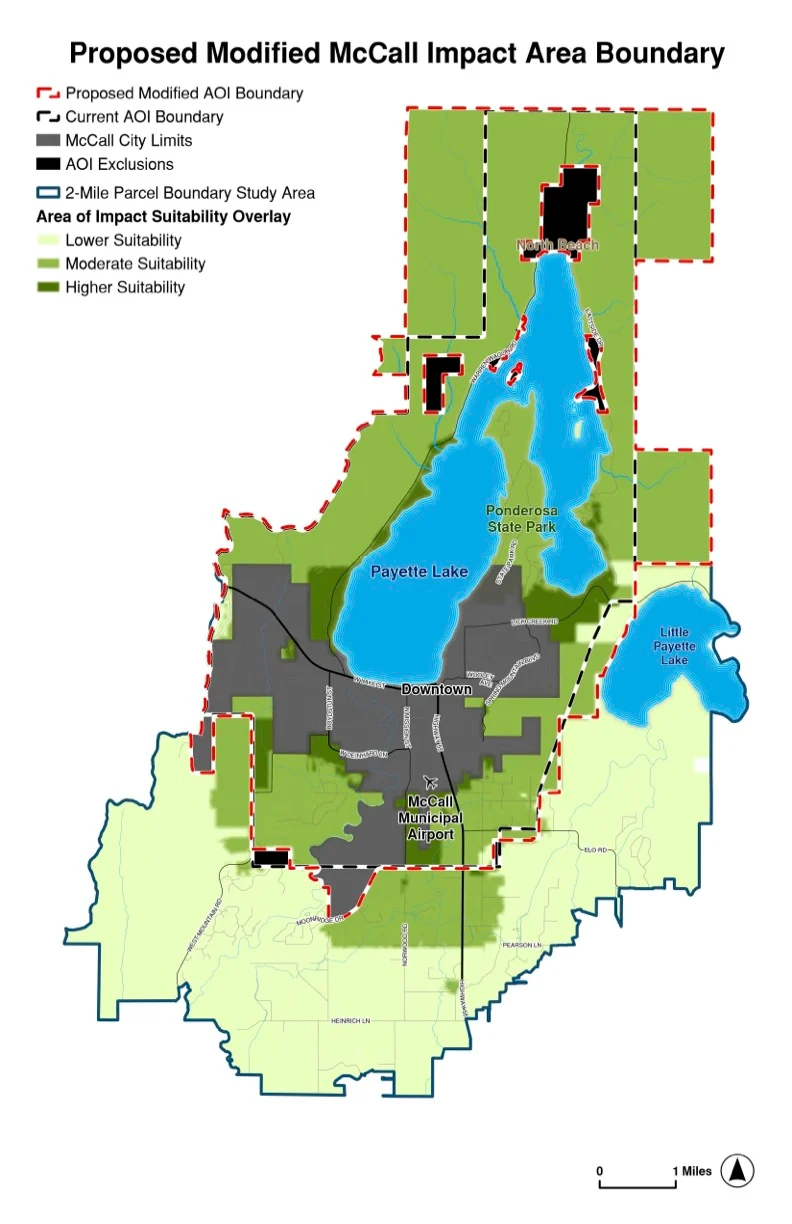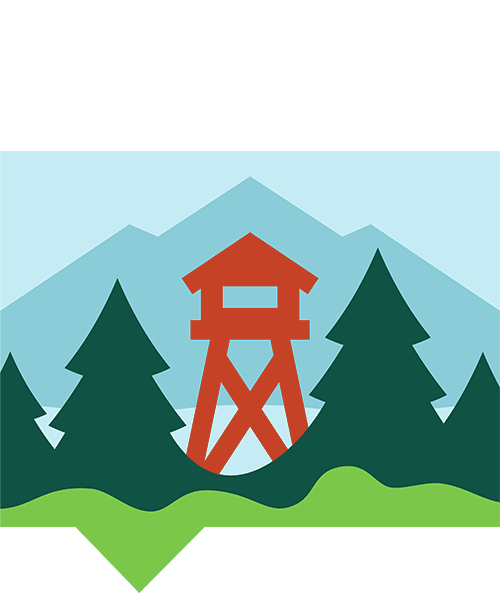The McCall Impact Area would largely remain as it is today under a final proposal the city submitted last week to Valley County Commissioners.
An updated map and an accompanying letter open a 90-day window for the county to revise the city’s proposal and adopt final boundaries. The new boundaries must be adopted by Aug. 14, or more than three months ahead of the Dec. 31 deadline imposed by state law.
The city’s proposal is scaled back from an initial submission for an expanded impact area but still calls for expanding the planning boundary to include state lands around the northern portion of Payette Lake, among other smaller changes.
Sherry Maupin, who chairs the Board of County Commissioners, said on Monday that the city’s request to start the 90-day review window came as a surprise.
“We weren’t anticipating that,” Maupin said. “It has shortened the window a bit on the opportunity to go back and forth with the city because we do have to have 30-day windows to do appropriate public notice.”
The city’s letter, which was signed by McCall Mayor Bob Giles, cited 2026 budget development as the reason for invoking the 90-day review period prescribed by law.
“This timeline should ensure both jurisdictions will have time to budget for appropriate resources and staff for the coming year,” the letter said.
What is the city’s new proposal?
While the city’s new proposal largely resembles the existing McCall Impact Area, some boundaries would be adjusted to avoid splitting subdivisions and parcels, as required by the new state law.
That includes expanding the boundaries around large public land parcels around the northern portion of Payette Lake that are split by the current impact area boundary.
Meanwhile, smaller parcels at the northern end of the lake would be removed from the impact area because they are further than two miles from city limits, which the new state law does not allow.
Previously, the city proposed extending the impact area’s southern boundary from near Elo Road to Johnson Lane, or by about one mile. That expansion is not included in the city’s final proposal.
The initial proposal, which was developed by overlaying data related to the criteria for impact areas in state law, was met with skepticism by the county commissioners.
Without donors like you, this story would not exist.
Make a donation of any size here
A new state law requires every county in the state to review existing impact areas and adopt new boundaries based on updated criteria, including the likelihood that lands included will be annexed into the city within five years.
County to shrink boundaries further
The city’s final proposal was discussed by the commissioners on Monday during a work session. The commissioners indicated they will look to scale the boundaries back even further.
“I foresee a very small impact area,” Commissioner Katlin Caldwell said. “Not the size it is today.”
Maupin and Caldwell both suggested that the boundaries will be set based on where McCall is likely to grow and what property could be annexed into the city. Limited sewer availability will factor into that equation, Maupin said.
State law requires landowner consent to annex property into city limits, which the commissioners said will limit the lands that could realistically become part of the city.
Impact area residents weigh in
Thirteen residents of the current impact area spoke during Monday’s meeting, most of whom told the commissioners they do not want to be in either the city or the impact area.
“I don’t think the city has a tremendous amount to offer us,” said Ann Heater, a resident of Payette Drive along Warren Wagon Road. “I’m very concerned about an increase in property taxes that could make it prohibitive for me to be able to hold onto this dwelling that’s been in my family for so long.”
Several residents of the Valley View Subdivision, located in the southwestern portion of the impact area, echoed Heater.
“The city really has, as far as I’m concerned, very little to offer us, besides the privilege of paying taxes for things we don’t need,” Craig Wasson said.
Meanwhile, four speakers said they favor remaining in the impact area under zoning codes that resemble those in place in city limits.
Becky Rine, a resident of South Samson Trail, said it makes geographic sense for McCall to regulate the impact area rather than the county.
“I can walk from my house on a pedestrian path to city hall,” Rine said. “I can’t walk to the county building.”
Carl Rukula, an Elo Road resident, said the impact area provides “insulation” from the county’s land use decisions, citing a recent expansion of Stor-It Self Storage that the commissioners approved despite a recommendation for denial by the McCall Area Planning and Zoning Commission.
“At this point, I do not trust the county commissioners to obey their own rules,” Rukula said. “I feel the city gives us a little more input than you guys.”
County split on administration changes
The commissioners briefly discussed how development applications should be administered in the impact area moving forward, though no decisions were made.
Currently, the county adopts zoning laws that closely resemble those in place in the city. The county commissioners then make final decisions on recommendations made by a joint planning and zoning commission.
Commissioner Neal Thompson said the county should take over administration of the impact area to reduce confusion surrounding the current joint process.
“I would like to see the county take back all the governance of the impact area,” Thompson said.
Caldwell, on the other hand, said she is “probably okay” with retaining the joint process.
“I still think compromise is something that we should all consider,” she said.
The county commissioners will continue their deliberations on McCall’s proposal on Tuesday at 9:15 a.m. at the Valley County Courthouse in Cascade. The meeting can also be viewed online.






